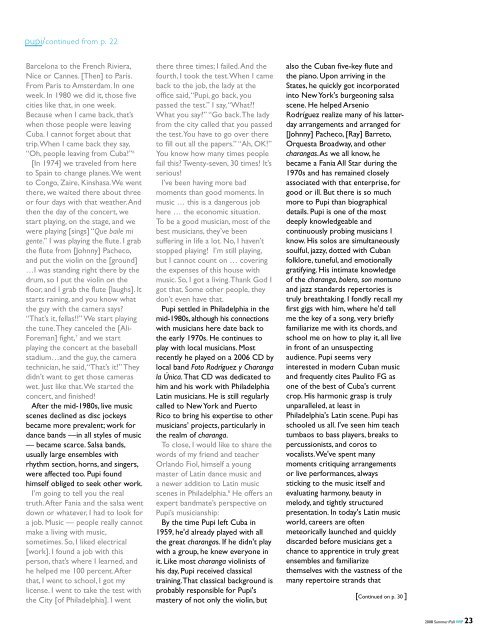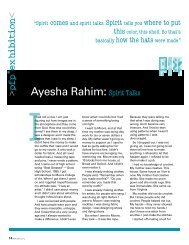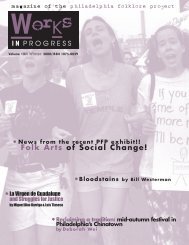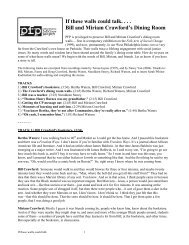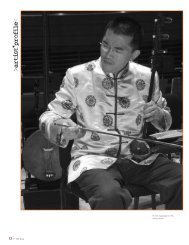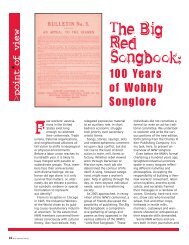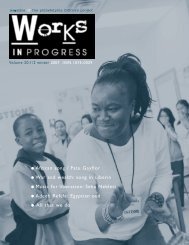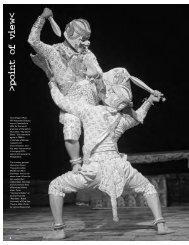View PDF - Philadelphia Folklore Project
View PDF - Philadelphia Folklore Project
View PDF - Philadelphia Folklore Project
You also want an ePaper? Increase the reach of your titles
YUMPU automatically turns print PDFs into web optimized ePapers that Google loves.
pupi/continued from p. 22<br />
Barcelona to the French Riviera,<br />
Nice or Cannes. [Then] to Paris.<br />
From Paris to Amsterdam. In one<br />
week. In 1980 we did it, those five<br />
cities like that, in one week.<br />
Because when I came back, that’s<br />
when those people were leaving<br />
Cuba. I cannot forget about that<br />
trip. When I came back they say,<br />
“Oh, people leaving from Cuba!” 6<br />
[In 1974] we traveled from here<br />
to Spain to change planes. We went<br />
to Congo, Zaire, Kinshasa. We went<br />
there, we waited there about three<br />
or four days with that weather. And<br />
then the day of the concert, we<br />
start playing, on the stage, and we<br />
were playing [sings] “Que baile mi<br />
gente.” I was playing the flute. I grab<br />
the flute from [Johnny] Pacheco,<br />
and put the violin on the [ground]<br />
…I was standing right there by the<br />
drum, so I put the violin on the<br />
floor, and I grab the flute [laughs]. It<br />
starts raining, and you know what<br />
the guy with the camera says<br />
“That’s it, fellas!!” We start playing<br />
the tune. They canceled the [Ali-<br />
Foreman] fight, 7 and we start<br />
playing the concert at the baseball<br />
stadium…and the guy, the camera<br />
technician, he said, “That’s it!” They<br />
didn’t want to get those cameras<br />
wet. Just like that. We started the<br />
concert, and finished!<br />
After the mid-1980s, live music<br />
scenes declined as disc jockeys<br />
became more prevalent; work for<br />
dance bands —in all styles of music<br />
— became scarce. Salsa bands,<br />
usually large ensembles with<br />
rhythm section, horns, and singers,<br />
were affected too. Pupi found<br />
himself obliged to seek other work.<br />
I’m going to tell you the real<br />
truth. After Fania and the salsa went<br />
down or whatever, I had to look for<br />
a job. Music — people really cannot<br />
make a living with music,<br />
sometimes. So, I liked electrical<br />
[work]. I found a job with this<br />
person, that’s where I learned, and<br />
he helped me 100 percent. After<br />
that, I went to school, I got my<br />
license. I went to take the test with<br />
the City [of <strong>Philadelphia</strong>]. I went<br />
there three times; I failed. And the<br />
fourth, I took the test. When I came<br />
back to the job, the lady at the<br />
office said, “Pupi, go back, you<br />
passed the test.” I say, “What!<br />
What you say” “Go back. The lady<br />
from the city called that you passed<br />
the test. You have to go over there<br />
to fill out all the papers.” “Ah, OK!”<br />
You know how many times people<br />
fail this Twenty-seven, 30 times! It’s<br />
serious!<br />
I’ve been having more bad<br />
moments than good moments. In<br />
music … this is a dangerous job<br />
here … the economic situation.<br />
To be a good musician, most of the<br />
best musicians, they’ve been<br />
suffering in life a lot. No, I haven’t<br />
stopped playing! I’m still playing,<br />
but I cannot count on … covering<br />
the expenses of this house with<br />
music. So, I got a living. Thank God I<br />
got that. Some other people, they<br />
don’t even have that.<br />
Pupi settled in <strong>Philadelphia</strong> in the<br />
mid-1980s, although his connections<br />
with musicians here date back to<br />
the early 1970s. He continues to<br />
play with local musicians. Most<br />
recently he played on a 2006 CD by<br />
local band Foto Rodríguez y Charanga<br />
la Única. That CD was dedicated to<br />
him and his work with <strong>Philadelphia</strong><br />
Latin musicians. He is still regularly<br />
called to New York and Puerto<br />
Rico to bring his expertise to other<br />
musicians’ projects, particularly in<br />
the realm of charanga.<br />
To close, I would like to share the<br />
words of my friend and teacher<br />
Orlando Fiol, himself a young<br />
master of Latin dance music and<br />
a newer addition to Latin music<br />
scenes in <strong>Philadelphia</strong>. 8 He offers an<br />
expert bandmate’s perspective on<br />
Pupi’s musicianship:<br />
By the time Pupi left Cuba in<br />
1959, he'd already played with all<br />
the great charangas. If he didn't play<br />
with a group, he knew everyone in<br />
it. Like most charanga violinists of<br />
his day, Pupi received classical<br />
training. That classical background is<br />
probably responsible for Pupi's<br />
mastery of not only the violin, but<br />
also the Cuban five-key flute and<br />
the piano. Upon arriving in the<br />
States, he quickly got incorporated<br />
into New York's burgeoning salsa<br />
scene. He helped Arsenio<br />
Rodríguez realize many of his latterday<br />
arrangements and arranged for<br />
[Johnny] Pacheco, [Ray] Barreto,<br />
Orquesta Broadway, and other<br />
charangas. As we all know, he<br />
became a Fania All Star during the<br />
1970s and has remained closely<br />
associated with that enterprise, for<br />
good or ill. But there is so much<br />
more to Pupi than biographical<br />
details. Pupi is one of the most<br />
deeply knowledgeable and<br />
continuously probing musicians I<br />
know. His solos are simultaneously<br />
soulful, jazzy, dotted with Cuban<br />
folklore, tuneful, and emotionally<br />
gratifying. His intimate knowledge<br />
of the charanga, bolero, son montuno<br />
and jazz standards repertories is<br />
truly breathtaking. I fondly recall my<br />
first gigs with him, where he'd tell<br />
me the key of a song, very briefly<br />
familiarize me with its chords, and<br />
school me on how to play it, all live<br />
in front of an unsuspecting<br />
audience. Pupi seems very<br />
interested in modern Cuban music<br />
and frequently cites Paulito FG as<br />
one of the best of Cuba's current<br />
crop. His harmonic grasp is truly<br />
unparalleled, at least in<br />
<strong>Philadelphia</strong>'s Latin scene. Pupi has<br />
schooled us all. I've seen him teach<br />
tumbaos to bass players, breaks to<br />
percussionists, and coros to<br />
vocalists. We've spent many<br />
moments critiquing arrangements<br />
or live performances, always<br />
sticking to the music itself and<br />
evaluating harmony, beauty in<br />
melody, and tightly structured<br />
presentation. In today's Latin music<br />
world, careers are often<br />
meteorically launched and quickly<br />
discarded before musicians get a<br />
chance to apprentice in truly great<br />
ensembles and familiarize<br />
themselves with the vastness of the<br />
many repertoire strands that<br />
[Continued on p. 30 ]<br />
2008 Summer /Fall WIP 23


